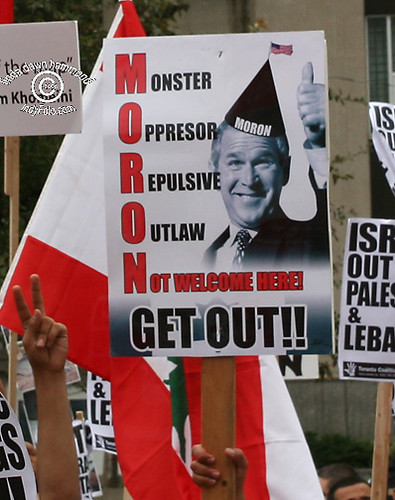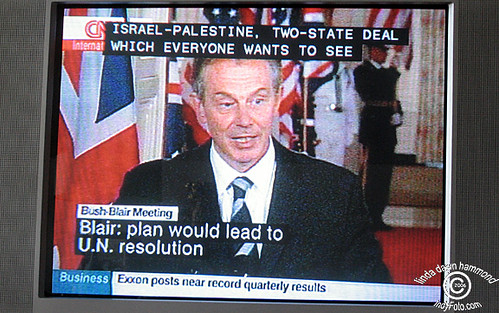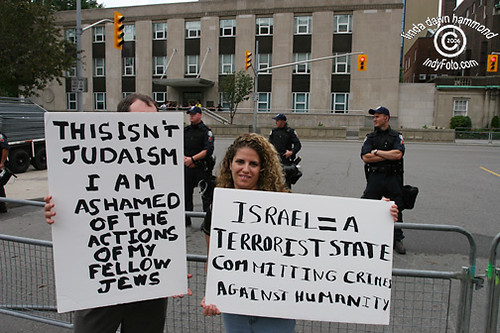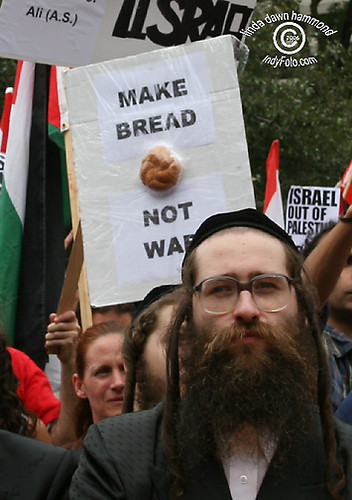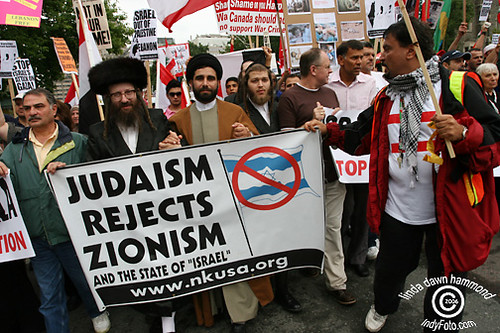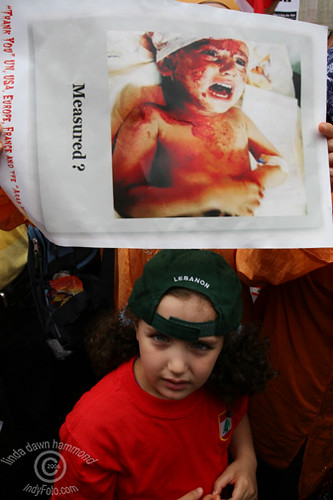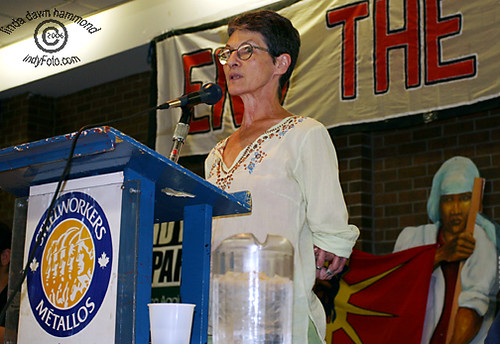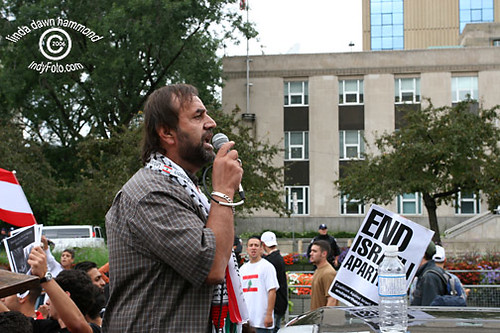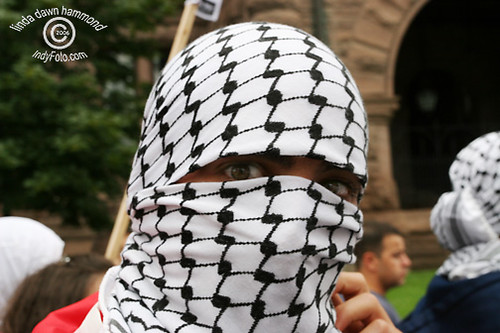STOP the ATTACK on Lebanon! Articles 4 of 4-"Yo, Blair!"
Sat. Aug.12, 06 1 PM at the Israeli Consulate, 180 Bloor St. West Toronto (W. of Avenue Rd., N. of Bloor)
http://www.nowar.ca
Email Canadian PM Harper at: pm@pm.gc.ca

'Yo, Blair!':
Transcript of actual conversation follows article.
http://news.independent.co.uk/world/politics/article1183389.ece
18 July 2006 13:21
Home > News > World > World Politics
'Private' chat heard by world caps disastrous G8 summit for Blair
By Andy McSmith in St Petersburg and Stephen Castle in Brussels
Published: 18 July 2006
Capping a miserable G8 summit for Tony Blair, President George Bush has spurned an offer from the Prime Minister to go to the Middle East as a peacemaker, after deciding that he would rather send the US Secretary of State, Condoleezza Rice.
The snub was revealed in a private conversation that was accidentally broadcast yesterday. It is the latest in a series of frustrating setbacks that bedevilled Mr Blair, as he spent the weekend trying to reprise the role of world statesman that he played successfully at the Gleneagles G8 meeting last year.
This year's gathering in St Petersburg, which ended yesterday, has seen Mr Blair struggling to make any headway on the two issues, climate change and world trade, that he wanted to push to the forefront of the agenda.
The Prime Minister has also thrown his personal authority behind a proposal to send an enlarged UN force into Lebanon, but yesterday he confessed that it was an "open question"as to whether it will ever happen, with other powerful nations clearly sceptical about the idea.
His unguarded chat with the US President provided a unique insight into the relationship between the two men, from George Bush's opening line - "Yo, Blair. How are you doing?" to his use of a mild expletive to describe the morass in the Lebanon.
They were talking before the start of yesterday's working lunch in St Petersburg's Konstantinovsky Palace, unaware that they were being overheard halfway round the world by a technician who was up early monitoring a live feed for an American TV station. By the time Mr Blair spotted the live microphone, the two leaders had unwittingly shared their private thoughts with the outside world - and revealed who is the boss.
A transcript of their conversation, compiled by Sky News, showed how Mr Bush simply blanked out the Prime Minister's suggestion that he visit the Middle East, telling him: "I think Condi is going to go pretty soon."
Mr Blair tried again, suggesting that the Americans could not afford to have their Secretary of State go into the region and come away empty handed, whereas, he said, "I can go out and just talk." At his press conference later, Mr Blair confirmed that the trip was off.
Mr Bush also revealed his frustration at other governments for not leaning heavily enough on the Syrians, which both leaders suspect of being able to control Hizbollah. "What they need to do is to get Syria to get Hizbollah to stop doing this shit," he remarked.
The rebuff by Mr Bush in this manner was one of several frustrating experiences for Mr Blair during the three-day summit.
Climate change, which Mr Blair sees as the most important long-term problem facing the planet, was mentioned only in passing in a summit dominated by the Middle East crisis and by two powers - the US and Russia - with vast energy-producing interests that they want to protect. But when the Prime Minister reports back to the Commons today, he is expected to emphasise that every head of government in St Petersburg acknowledged that climate change needed to be addressed.
His mild expression of concern about civil rights in Russia was brushed off twice by President Vladimir Putin. First, with a joke at the Prime Minister's expense about the recent arrest of his friend, Lord Levy. Then later with an attack on the UK Government for failing to extradite a Chechen rebel, Akhmed Zakayev, whom the Russians want to put on trial for alleged terrorist offences.
Until yesterday's working lunch, Mr Blair also feared that his efforts to revive talks on a world trade deal had reached a dead end. In his private conversation with George Bush, he is heard saying "maybe it's impossible". But at his press conference later, he said his hopes of success had been restored by the lunchtime discussion, chaired by the German Chancellor Angela Merkel, in which all the protagonists seemed to agree that it was necessary to compromise.
But Mr Blair still risks being humiliated over his call for a peacekeeping force that would go into Lebanon after a ceasefire has been achieved. Mr Blair wants a multinational force much larger than the present contingent of 2,000 Ghanaian and Indian troops on the Lebanon-Israel border. But his hand is weakened by his reluctance to send in any British troops. European foreign ministers backed the principle of an international force, though no clear plan for a mission has yet been tabled.
Squish Your Head!
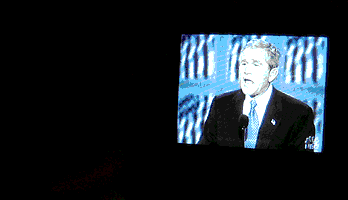
With apologies and thanks to "Kids in the Hall' for inspiration!
http://news.independent.co.uk/world/politics/article1183388.ece
18 July 2006 13:15
Home > News > World > World Politics
'Yo, Blair!': Overheard at the G8
Published: 18 July 2006
Bush: Yo, Blair. How are you doing? (Does he regard Mr Blair as an equal? What about 'Yo, Tony'?)
Blair: I'm just...
Bush: You're leaving?
Blair: No, no, no not yet. On this trade thingy....(inaudible) (Mr Blair is getting anxious that the World Trade Organisation is falling apart because some nations, including the US, are putting domestic interests before a worldwide free trade agreement)
Bush: Yeah, I told that to the man.
Blair: Are you planning to say that here or not?
Bush: If you want me to.
Blair: Well, it's just that if the discussion arises...
Bush: I just want some movement.
Blair: Yeah.
Bush: Yesterday we didn't see much movement.
Blair: No, no, it may be that it's not, it may be that it's impossible.
Bush: I am prepared to say it.
Blair: But it's just I think what we need to be an opposition...
Bush: Who is introducing the trade?
Blair: Angela (The German Chancellor, Angela Merkel, will lead the trade discussion. That is good for Mr Blair. She is on his side.)
Bush: Tell her to call 'em.
Blair: Yes.
Bush: Tell her to put him on, them on the spot. Thanks for the sweater it's awfully thoughtful of you.
Blair: It's a pleasure.
Bush: I know you picked it out yourself.
Blair: Oh, absolutely, in fact (inaudible)
Bush: What about Kofi? (inaudible) His attitude to ceasefire and everything else ... happens. (Change of subject. Now they are on to Lebanon and the UN secretary general, Kofi Annan)
Blair: Yeah, no I think the (inaudible) is really difficult. We can't stop this unless you get this international business agreed.
Bush: Yeah. (Mr Blair is trying to push the idea of a UN peacekeeping force in Lebanon. That 'yeah' does not sound like a wholehearted agreement)
Blair: I don't know what you guys have talked about, but as I say I am perfectly happy to try and see what the lie of the land is, but you need that done quickly because otherwise it will spiral. (Meaning: 'Please, George, let me go to the Middle East and be a world statesman')
Bush: I think Condi is going to go pretty soon. (Meaning: 'No')
Blair: But that's, that's, that's all that matters. But if you... you see it will take some time to get that together. (Meaning: 'Oh well, all right, if you don't want me to. Just a thought')
Bush: Yeah, yeah.
Blair: But at least it gives people...
Bush: It's a process, I agree. I told her your offer to... (Meaning: 'Drop it. You're not going.')
Blair: Well... it's only if I mean... you know. If she's got a..., or if she needs the ground prepared as it were... Because obviously if she goes out, she's got to succeed, if it were, whereas I can go out and just talk.
Bush: You see, the ... thing is what they need to do is to get Syria, to get Hizbollah to stop doing this shit and it's over. (Mr Bush is expressing his belief that Syria is pulling Hizbollah's strings, while Mr Blair is hinting the Syrians might be up to no good as well)
Blair: (inaudible)
Bush: (inaudible)
Blair: Syria.
Bush: Why?
Blair: Because I think this is all part of the same thing.
Bush: Yeah.
Blair: What does he think? He thinks if Lebanon turns out fine, if we get a solution in Israel and Palestine, Iraq goes in the right way... (Here they might be talking about Kofi Annan, or they may mean the Syrian President, Bashir Assad)
Bush: Yeah, yeah, he is sweet. (Mr Bush is probably being sarcastic)
Blair: He is honey. And that's what the whole thing is about. It's the same with Iraq.
Bush: I felt like telling Kofi to call, to get on the phone to Assad and make something happen.
Blair: Yeah.
Bush: (inaudible)
Blair:(inaudible)
Bush: We are not blaming the Lebanese government.
Blair: Is this...? (at this point Blair taps the microphone in front of him and the sound is cut.)
Bush: Yo, Blair. How are you doing? (Does he regard Mr Blair as an equal? What about 'Yo, Tony'?)
Blair: I'm just...
Bush: You're leaving?
Blair: No, no, no not yet. On this trade thingy....(inaudible) (Mr Blair is getting anxious that the World Trade Organisation is falling apart because some nations, including the US, are putting domestic interests before a worldwide free trade agreement)
Bush: Yeah, I told that to the man.
Blair: Are you planning to say that here or not?
Bush: If you want me to.
Blair: Well, it's just that if the discussion arises...
Bush: I just want some movement.
Blair: Yeah.
Bush: Yesterday we didn't see much movement.
Blair: No, no, it may be that it's not, it may be that it's impossible.
Bush: I am prepared to say it.
Blair: But it's just I think what we need to be an opposition...
Bush: Who is introducing the trade?
Blair: Angela (The German Chancellor, Angela Merkel, will lead the trade discussion. That is good for Mr Blair. She is on his side.)
Bush: Tell her to call 'em.
Blair: Yes.
Bush: Tell her to put him on, them on the spot. Thanks for the sweater it's awfully thoughtful of you.
Blair: It's a pleasure.
Bush: I know you picked it out yourself.
Blair: Oh, absolutely, in fact (inaudible)
Bush: What about Kofi? (inaudible) His attitude to ceasefire and everything else ... happens. (Change of subject. Now they are on to Lebanon and the UN secretary general, Kofi Annan)
Blair: Yeah, no I think the (inaudible) is really difficult. We can't stop this unless you get this international business agreed.
Bush: Yeah. (Mr Blair is trying to push the idea of a UN peacekeeping force in Lebanon. That 'yeah' does not sound like a wholehearted agreement)
Blair: I don't know what you guys have talked about, but as I say I am perfectly happy to try and see what the lie of the land is, but you need that done quickly because otherwise it will spiral. (Meaning: 'Please, George, let me go to the Middle East and be a world statesman')
Bush: I think Condi is going to go pretty soon. (Meaning: 'No')
Blair: But that's, that's, that's all that matters. But if you... you see it will take some time to get that together. (Meaning: 'Oh well, all right, if you don't want me to. Just a thought')
Bush: Yeah, yeah.
Blair: But at least it gives people...
Bush: It's a process, I agree. I told her your offer to... (Meaning: 'Drop it. You're not going.')
Blair: Well... it's only if I mean... you know. If she's got a..., or if she needs the ground prepared as it were... Because obviously if she goes out, she's got to succeed, if it were, whereas I can go out and just talk.
Bush: You see, the ... thing is what they need to do is to get Syria, to get Hizbollah to stop doing this shit and it's over. (Mr Bush is expressing his belief that Syria is pulling Hizbollah's strings, while Mr Blair is hinting the Syrians might be up to no good as well)
Blair: (inaudible)
Bush: (inaudible)
Blair: Syria.
Bush: Why?
Blair: Because I think this is all part of the same thing.
Bush: Yeah.
Blair: What does he think? He thinks if Lebanon turns out fine, if we get a solution in Israel and Palestine, Iraq goes in the right way... (Here they might be talking about Kofi Annan, or they may mean the Syrian President, Bashir Assad)
Bush: Yeah, yeah, he is sweet. (Mr Bush is probably being sarcastic)
Blair: He is honey. And that's what the whole thing is about. It's the same with Iraq.
Bush: I felt like telling Kofi to call, to get on the phone to Assad and make something happen.
Blair: Yeah.
Bush: (inaudible)
Blair:(inaudible)
Bush: We are not blaming the Lebanese government.
Blair: Is this...? (at this point Blair taps the microphone in front of him and the sound is cut.)
http://www.flickr.com/photos/56709485@N00/sets/72157594208421837/
STOP WAR INDYFOTO Set
WHO's PAYING- WHO's PROFITING?
One Canadian, Ali Mallah, Vice-president of Canadian Arab Federation, has a very personal investment in his desire to see an immediate halt to the bombing in Lebanon- his wife and 2 children, ages 9 and 11, are there visiting family and are now in immediate danger in the South of Lebanon- the area worst hit in the Israeli bombings, and now completely cut off from humanitarian aid and supplies. The children are being brave, and said that they don't want to abandon their grandmother and cousins. Many foreign nationals are remaining for similar reasons.
CNN news reported that the cost of evacuating one American family, only to Cyprus, was $4000.- which the US government CHARGED to the FAMILY's credit card. I wonder if the American families WITH funds are getting out first... and if this has any bearing on the number of people choosing to take the much more dangerous overland route to neighbouring countries. America, one of the richest countries in the world, is the only one I've heard of so far which is putting the cost of the evacuation on the victims' shoulders.
Not that the US doesn't have money to burn...
David Clark, a former UK Labour special adviser at the Foreign Office, wrote in this week's Guardian, "Yet the US remains entirely
complicit in its role as Israel's main strategic ally. In the midst of last
week's onslaught, in which Israeli bombers killed dozens of Lebanese civilians, the Pentagon announced the export of $210m of aviation fuel to help Israel "keep peace and security in the region". Even Britain and other European countries indulge in a form of diplomatic misdirection by focusing one-sidedly on the roles played by Syria and Iran. " Some Lebanese are perplexed by the targeting of their country- after all, they don't have any oil, unlike some of their richer neighbours. The oil companies, however, are reporting record profits, caused by the panic over oil supplies possibly being disrupted, which in turn leads to greater costs for consumers at the pump. Our governments, which add a hefty tax to the already inflated prices, therefore also profit from the mayhem this war is causing. And in the end, unfortunate Lebanon will have to take out loans at high interest rates to pay for the reconstruction of their country, profiting the organizations that will do the lending. No wonder they're all taking their time to resolve this.
I think that Lebanon's government, and the refugees forced to flee their shores, should consider sending ALL of the BILLS to Israel, to be in turn paid by their "special friend", I expect. It's only fair.
This site contains copyrighted material the use of which has not always been
specifically authorized by the copyright owner. We are making such material available in our efforts
to advance understanding of environmental, political, human rights, economic, democracy, scientific,
and social justice issues, etc. We believe this constitutes a 'fair use' of any such copyrighted
material as provided for in section 107 of the US Copyright Law. In accordance with Title 17 U.S.C.
Section 107, the material on this site is distributed without profit to those who have expressed a
prior interest in receiving the included information for research and educational purposes. For more
information go to:
http://www.law.cornell.edu/uscode/17/107.shtml. If you wish to use copyrighted material from
this site for purposes of your own that go beyond 'fair use', you must obtain permission from the
copyright owner.
